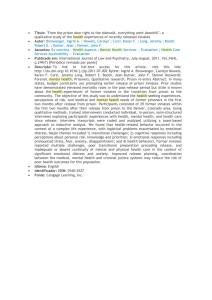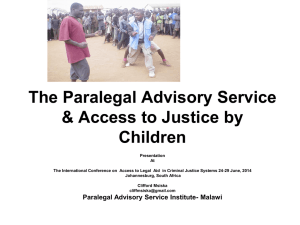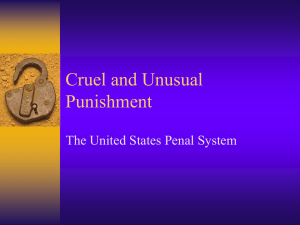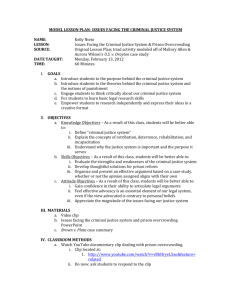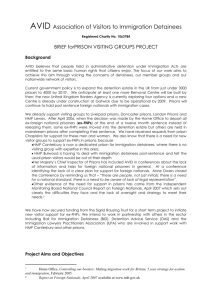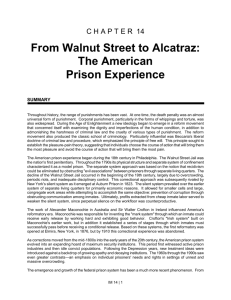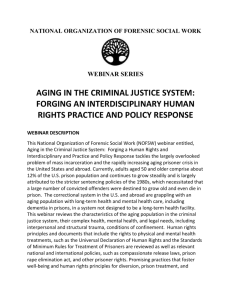Plenary session 3 - European Forum for Restorative Justice
advertisement
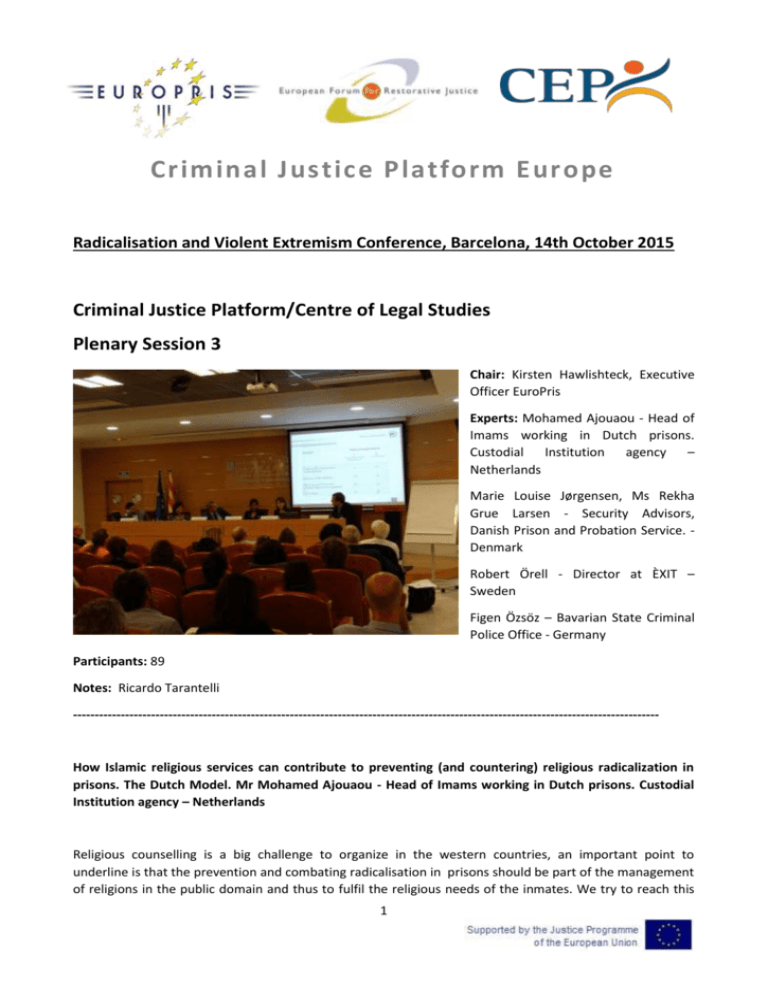
Criminal Justice Platform Europe Radicalisation and Violent Extremism Conference, Barcelona, 14th October 2015 Criminal Justice Platform/Centre of Legal Studies Plenary Session 3 Chair: Kirsten Hawlishteck, Executive Officer EuroPris Experts: Mohamed Ajouaou - Head of Imams working in Dutch prisons. Custodial Institution agency – Netherlands Marie Louise Jørgensen, Ms Rekha Grue Larsen - Security Advisors, Danish Prison and Probation Service. Denmark Robert Örell - Director at ÈXIT – Sweden Figen Özsöz – Bavarian State Criminal Police Office - Germany Participants: 89 Notes: Ricardo Tarantelli --------------------------------------------------------------------------------------------------------------------------------------- How Islamic religious services can contribute to preventing (and countering) religious radicalization in prisons. The Dutch Model. Mr Mohamed Ajouaou - Head of Imams working in Dutch prisons. Custodial Institution agency – Netherlands Religious counselling is a big challenge to organize in the western countries, an important point to underline is that the prevention and combating radicalisation in prisons should be part of the management of religions in the public domain and thus to fulfil the religious needs of the inmates. We try to reach this 1 aim with the implementation of spiritual services within the walls, we have been offering religious guidance to detainees and prison imams since 2008 and therefore the imams were recognized as public servants. Since the attacks of ex-prisoners in Belgium and France there was more focus on what factors contribute to the radicalisation of Muslim detainees. Therefore, what is the role of prison imams in this? The inmates are influenced by. prison imams who have radical views; a lack of religious supervision; other detainees; religious reading material; influence of external networks and communities. We work on the professionalization of our team and, through careful selection, we try to exclude imams with radical backgrounds. Back on Track Program Ms Marie Louise Jørgensen, Ms Rekha Grue Larsen - Security Advisors, Danish Prison and Probation Service. - Denmark Marie Louise: ten years ago we faced a new group of criminals, to solve the situation a new programme was born. “Back on track” was a 3 year project from 2011 to 2014. The purpose was to develop a programme to prevent extremist-views related crime. A mentoring programme was additionally implemented, the target of this programmes are the former inmates with radical views. Rekha: the mentoring programme adds up to all the other ones: it is an individual plan that aims at reducing the chances of recidivism in a former detainee. Many sources claim that this mentoring programme could be helpful to reduce recidivism effectively. The purpose of the mentoring programme was to support and strengthen motivation to opt out from a violent life. Mentors are recruited from the existing mentor pool who already have experience with this type of work: it is mandatory for them to have a previous experience. Back on track had a small group of 10-14 mentors when it begun notwithstanding much focus was put on social training skill aside strong coordination plans with the police. The mentors have to be prepared when inmates are released. The challenges are still many: recruitment of skilled mentors; need for diversity within the mentor pool. EXIT Program Mr Robert Örell - Director at ÈXIT – Sweden We seek to help people exit the white power group. We also help people from criminal gangs as we discovered that the “exit” plan was easily transferrable to the crime gangs. 4 perspective on what we actually do (we work all over Sweden): we seek the support from ex white power/crime gangs members; we collect different experiences and knowledge ; the personal setting of the work and we work on individual basis. To plan an adequate intervention: what type of situation is the person in? We map it and evaluate the person’s characters to bridge these people with the society. The success of our organization is networking and linking our work with others’. We work a lot on motivation which is constant and depends on a lot of factors. Experiences with young violent right-wing extremist prisoners in German juvenile prisons Ms Figen Özsöz – Bavarian State Criminal Police Office - Germany There are two types of right wing extremist offenders: ideological and violent. However, most of right-wing extremist prisoners have a past of criminal behaviour that is not related to hate-crimes. They tend to build 2 subcultures within the walls and hold a correct behaviour while in prison, misleading the prison staff that their behaviour is good. For the rehabilitation of right wing extremist, it is important for them not to join a subculture within the walls, as the feeling of loyalty toward the group might prevent them from taking part in the rehabilitative programs. They should be placed in small and manageable units rather than in big cell blocks and the prison management should allow their families and friends to participate in the rehabilitative process. EuroPris - European Organisation of Prison and Correctional Services EFRJ- European Forum for Restorative Justice CEP - Confederation of European Probation 3

